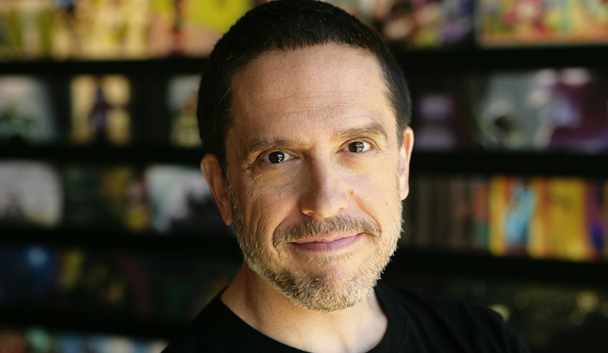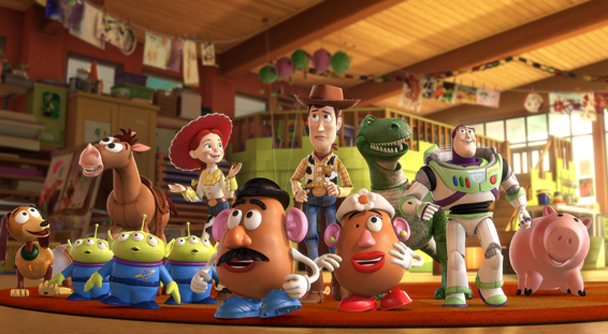Lee Unkrich
The director of Toy Story 3 on crying adults and closing the best trilogy of all time.
The director Lee Unkrich may not be a household name, but the films that he has directed for Pixar certainly are. He has worked at the company since it’s inception in 1995, working up from film editing to directing modern classics such as Finding Nemo and Monsters, Inc. His latest, Toy Story 3, has already broken all previous cinema records set by Pixar films, and is topping box offices across the world. Suki Ferguson quizzes him for the secret to Pixar’s unparalleled success, and finds out whether he really intended to make us all cry…
So why Toy Story 3?
I guess we felt like we had more to say. We didn’t want to say goodbye to Buzz and Woody completely – they were kind of the flagship characters of our studio and we don’t want to see them go. The more we started to talk about it the more we came to realise that we hadn’t really told a complete story in the first two films. We thought we had told Toy Story 2 in a way that was the end of the story: Buzz and Woody make peace with the fact that Andy’s going to grow up someday, and they decide to enjoy every moment that they have until that day comes. But the more we talked about it we thought that was kind of a naive sentiment, right? We think we know how we’re going to react if something happens off in the future, but it’s another thing entirely to find yourself at that day. And we thought it would be interesting to see how Woody and Buzz, and the rest of the toys for that matter, dealt with that inevitability of being outgrown and not being needed anymore.
The pressure must have been quite great…
Well, I never intended to try and top one and two; the pressure was great to even just not screw it up! And to make a film that was even remotely worthy of sitting alongside the first two. So, I felt that pressure from day one and I felt it all the way through to the last day that we finished the movie!
Was it a daunting task for you, knowing that Toy Story is sort of a flagship for Pixar?
Well, I felt equipped, from a creative and technical standpoint, to do it. I did edit the first Toy Story and I co-directed the second one. I mean, I co directed Monsters Inc. and Finding Nemo, so I knew my way around. I knew I could do it; it was still daunting. But at a certain point I had to put that aside because it would’ve been crippling, and I wouldn’t have been able to make the movie. We just had to set about making the film the way we made the first two. We just gotta keep our eyes on the prize by telling a story honestly and in an entertaining way.
So are you relieved now?
Oh yeah, completely. I mean, we’ve had great reviews the world over, and everywhere it’s opened it’s been a really big hit. At this point, I’m finally relieved.
Do you have any projects on the go now, now that you’ve finished Toy Story 3?
Me personally, I’m going to take a long vacation once I’ve finished promoting the movie, then Darla (Anderson, TS3 producer) and I are going to make a film together with Pixar.
Will that be a big secret?
Oh, yeah, yeah! I’m not going to talk about that just now…
You have three children. Do you use them for advice when you make Toy Story films?
Yeah now and then, I showed them a couple of early storyboards, just to get their general take on it, and you know there’s that scene towards the end of the film that’s a bit intense? I showed them some early versions of that just to see what they would have to say about it. They confirmed just what we found when we screened the movie for lots of kids – everybody was fine with it. You know, kids like to be scared a bit and I don’t think there’s anything wrong with having bits of intensity in a film.
There has been much writing about Toy Story 3 as a film that makes grown men cry; does it surprise you that it has that effect, and what do you think they cry over?
When we were making the film we screened it a lot, and there were a lot of tears. People from Pixar would cry at the end, and at different spots in the film, and at that point it just told me we were doing our job well. We were telling a story that people were getting invested in. So it didn’t surprise me when I heard that people were crying, but I have been surprised by how much. And how much it’s being talked about. I wasn’t expecting that at all.
I think it’s due to a few things; in one regard, it’s a pining for childhood, the loss of innocence. I think you continue to feel that all throughout life, that feeling of no longer being a kid. I remember when I was 18 and I was off at college, I saw the movie ET. I had seen it before when I was younger, but at that point in my life I saw it again and I was crying. After the movie was over I couldn’t stop, and I realized I was mourning the fact that I wasn’t a kid anymore. I think a lot of people feel various shades of that.
But I think there’s also something else at work. I was talking to the writer Michael Arndt about it; a lot of us want to be appreciated, right? We want to be cared for and loved, and feel like there’s a reason for us to be in the world. It’s a common thing that people feel. In the story, the toys spend most of the film not being appreciated, feeling abandoned, feeling forgotten. Every turn they take, they get more of it. Finally, at the end of the film – unexpectedly – they get this reaffirmation that Andy actually did care about them and they were important to him. He plays with them one last time and I think that touches something very deep in a lot of people, and it becomes emotional. Not because of the specifics of what’s happening on the screen, but because it’s tapping into something deeper.
Do you think that’s too grown up for kids?
I don’t think so, because a kid watching the film doesn’t feel those same feelings. They experience the film in a completely different way, so I’m happy that no matter where you are in life you’re getting something different out of the film. For [the kids], I think they empathise with the toys because they see some characters that don’t know what their future’s going to be. Just on that level, they care about them and want to see things work out for them. No, we’ve never thought anything in the film was not okay for kids.
We found that adults experience that scene in a very different way than kids do. I think that adults are much more in touch with their own mortality – because they’re closer to it! And so they experienced that scene, and the emotion of that scene, in a very different way.
How do you manage balancing humour between adults and kids?
We’ve always tried to make ourselves laugh, take something that’s funny and then make sure it’s appropriate for kids. We toe the line a little bit here and there – there are plenty of things that make us laugh that we don’t put in because they’re wildly inappropriate!
Which Pixar characters are you’re kids favourites?
They loved Up, and Doug was a big hit in our house. But every film has been popular. In this one, Toy Story 3…I think they liked the peas in the pod.
When you were a kid, what was your favourite toy, and what was it called?
I had a few that I remember fondly. I had a ventriloquist’s dummy, named Willy Talk. He looked kind of like Ken, he had moulded plastic hair. The funny thing about him was that I loved him during the day – I carried him around everywhere – but I was afraid of him at night. I was afraid he was going to come alive and jump on my bed, so I would hide him at night and tuck him deep into my closet. I had this weird love/hate relationship with him…but that kind of speaks to the fact that kids are afraid of toys, sometimes. We put toys in the movie, like Big Baby, that are speaking to that creepy factor that some toys have.
Yeah, you’ve kind of replaced the ‘scary clown’ with the ‘scary baby’…
I don’t think that we’ve done anything new! I remember as a child, at a friends house, his little sister had a roomful of dolls. I always found that really creepy. I could never understand how [she] could sleep at night with shelves of dolls staring down at her!
How do you account for the success of Pixar?
A lot of things. We have a ruthless devotion to telling the best stories that we can, and we just stop at nothing to make sure that they’re great. Luckily we have the ability to do that because of how the studio is run top down by creatives, like John Lasseter. Everybody supports the notion of no compromise. Pixar’s also full of people whose own standards for themselves are exceedingly high. You get that combination of things, and good things will come out of it.
There’s never any guarantee, however, that things will be successful – yes, we’ve managed to make eleven films in a row that are big hits, but the twelfth one could be…not that. That’s been the case every step of the way. There’s some degree of luck, I suppose. We’ve never taken it for granted, we’re never just assumed the next movie we make is going to be big.
Will you always be making things in 3D now?
The 3D is relatively easy for us to do in our medium, in CG animation, so there’s really no reason not to do it. In the case of Toy Story it really helps with the scale – the way the story’s being told from a toy’s perspective in a giant human world. It kind helps cement that feeling of experiencing the world from a different perspective.
I like taking a light hand with the 3D; I don’t like films that have things poking out into the audience, because it gives me eyestrain, number one, and number two? It reminds me that I’m sitting in a theatre, watching a movie. I feel like my job, as a director, is to let people forget that, to allow them to become engrossed in the story and forget they’re in a theatre. I think gimmicky 3D does the complete opposite of that. We’ve received some criticism for not taking advantage of 3D more, but it’s a conscious choice.
Is there any defining characteristic to a Pixar film?
We try and have the sentiment and the ideas be as universal as possible; we try and make them wildly funny, but still be emotional. Walt Disney once said that “for every laugh, there should be a tear” and that’s a philosophy that we’ve really taken to heart on everything that we’ve done.











COMMENTS